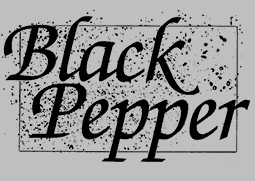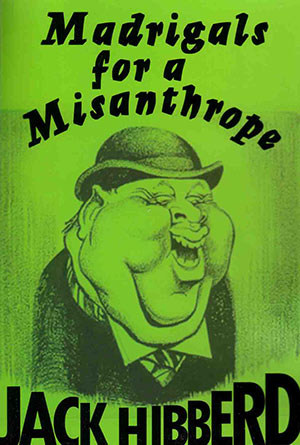|
Book
Sample
Salt and Pepper Sonnets
Jock
Jock liked to perch on the front veranda’s concrete steps
and scrutinize the clouds (like Roman entrails) the sky.
He always wore a tall-domed black hat, waistcoat, had pets
by his boots: a plump orange cat, a charcoal ochre-eyed
dog, Duke, whom only my grandfather could entirely trust.
Between rich stories, Jock would decipher the tacit heavens
scrupulously: tomorrow sun-licked, the next day tempests.
A miner, erudite amateur geologist, for whom the long caverns
and wriggling reefs beneath Bendigo were quite without mystery.
His oblong Yorkshire yet Irish face, his brown eyes, spelt warmth
when sober. Eva, a Hannan, worked the house, distributed hilarity
while she kept an eye on her husband’s moods from citrus dawn
to black night, and hid the beer inventively before she slept.
When he died she went to the veranda (the pets had fled), wept.
Eva
grandmother
Eva shrivelled, following that somnolent pneumonic death.
Once indefatigably buoyant, an irreducible woman,
as pillowy as the suet dumplings she cooked. He left
her profoundly puzzled, cast adrift in some no-man’s
zone. She padded cautiously around, or sat, a loose sack
on his frayed chair – her repartee and wit, Cork-sharp,
now blank and blunt. Her hair hung like grey flax.
Her loud gregariousness became a cloaked silent harp
at dinners, afternoons of whist, even family affairs.
She toured Australia in a bus of merry widows. A ploy
which worked for a few weeks... then that cavernous stare.
Her widowhood her biological loss had exterminated joy,
and in its place colonic cancer grew: a huge unexplained
tumult. Suet-white, Eva joined her husband in boiling pain.
Birth
The mother screams and screams, blood curdles
as father, husband, stands, petrified, stunned,
unable to comprehend why these colossal hurdles
of pain occur, these detonations in her lungs,
pelvis and abdomen, why this doublehandedness:
gift-bearing with one, gouging out with the other?
So, right at the very start we have ambivalence,
as if young life must present old death to lovers.
The nuns and priests talk, still, of original sin.
Old wives tell tales of rapidly unremembered pain.
Biologists claim that maternal bonds would wear thin
without these rites of passage: Medea again and again.
At agony’s climax she ejaculates: Jesus Christ.
There are moans and moos of joy. The baby shrieks.
Breasts
I must confess, without patronage, I enjoy them all,
especially those whose areolae jut: the shape of pears.
I crave the mountainous ones, the feral, the small,
those that loll down to the waist, the upwardly austere
with the cream flesh and baroque architecture of bananas,
and surmounted, when aroused, by sarcastic black nipples.
I am prone to draw them out from their apricot pyjamas
at parties, between lips and teeth, relish the ripples
as they bounce and balloon and blush beetroot at climax.
Sometimes I merely wish my wriggling face be smothered,
to insert my mouth, potato snout, between a cleavage’s crack,
to feel, underneath, that once again I am being mothered,
that behind each breast’s ancient yet diaphanous silk
lie serene reservoirs of panacean and balsamic milk.
Divorce
It can be here that honour is most put to the test,
except when separation has been judicious, mutual...
each has fallen out of love, or into enmity. The rest,
at worst, can emulate the hounding of a criminal,
or range between custodial revenge and avarice.
For those still besotted there must be ritualistic
retribution – less Medea-like, but a saving of face,
a polishing up of public pride, so shit does not stick.
The insult of such a loss can twist passion into hate,
so with the flair of a Bernhardt or Olivier, a role
can utterly mask the utter love beneath. She waits,
he waits, in an empty, stale, sheetless half-cold
bed, listening for the sound of footsteps, bare
preferably, of a loved one, or children, on a stair.
McDonalds
McDonalds and its swift nutritious food have been much maligned
by those envious of such success, or foes of America’s
soi-disant evil.
Da Vinci, Michelangelo, had they been chefs today, would’ve
designed
the same product, and never thought of addressing a wall or easel.
Then there are those acrimonious analysts and bigots who accuse
McDonalds of indulging in, propagating, the latest manifestation of
America’s obsession with (and concomitant exploitation, abuse,
mincing employees) slavery. In truth, their young workers love
the long hours, the unremitting education, the cherished chance
to secure an unbudgeable position on the lowest but broad rung
of a great ladder. Besides, McDonalds is philanthropic, gallant,
supporting children’s hospitals, adolescents,
society’s unsung.
So, folks, fang into French fries, mayo, the thrift of a SuperMac:
the world has yet to unearth a grander antidote to heart attacks.
Sunsets
I most enjoy those that are brazen and orange
when the sun resembles a buttock of succulent fruit
and declares that the day has been one long triumph,
and that we must tap-dance to dusk in our very best suit.
I least enjoy those that are thin, concentrated red
extruding (between lengths of grey metallic cloud)
lances and lasers which drill me with loss and dread,
and twist evening into, not a lemon tent, but a shroud.
The sun then is bipolar, extreme; even in repose
he exhibits moods of murder or of jubilant magic.
For, unlike the suave moon, the sun’s a primitive force,
and we are its subjects: now guffawing, now tragic.
Sometimes, we bounce like baboons on his back,
at other times we are irradiated, parchment flat.
The
Wind of Madness
‘I have felt the wind of the wing of madness,’ wrote
Charles Baudelaire in his book My Heart Laid Bare.
Insanity is a swirl: the brain twists as if on a rope:
a tumbleweed, small round tree, whipped by violent air.
Once lunatics were frog-marched, banished, to the sea,
where another brand of wind propelled their ships of fools.
Next they were confined, like masochists in monasteries,
or half-eaten lepers, in dungeons too maggoty for ghouls.
The Age of Enlightenment saw them released on sprees
of anarchy, orgies, noonday masses, lampooning officialdom.
So, once again these putative fruitcakes were seized,
certified, manacled, and caged in humourless asylums.
More recently we have inserted needles, alcohol, and slit
lobes, tried coma, electric shock, drugs: for brains on stilts.
Joy
Rarely unalloyed, she comes attired in tinsel
and froth, and scoops you up in fragrant arms,
offers keen breasts, humours, juice: ecstasy rinses
glands, soul, and brain; then you collapse, disarmed.
Next he might arrive in motley, a great buffoon,
or as an oracular judge, a Moses, a sage curmudgeon,
to save the lost day and exorcize spinal gloom.
Melancholy plods lumpily along; joy streaks: urgent,
a flashing vision, intellectual sensual force,
different to happiness, contentment, which are earned;
like luck, unexpected, a dream in which a purple horse
appears conducting a black female President to the green
lawns of the White House. We wake up, incredulous, drained,
but enhanced: this could not possibly occur again.
Friendship
Much prized by Aristotle and his peripatetic school,
yet underestimated, in particular if compared to love.
Even so, friendships arrive and vanish as a rule.
Sweet antic children are the most treacherous: they club
inseparably, as thick as Jesuits one minute, the next
awarding heaped cold shoulders to a sudden leper.
Those established in hormonal adolescence can be best.
Others, revisited, find old soulmates somewhat wetter.
A congregation of friends can provide sepulchral relief
to the loud congresses and rabid epilepsies of sex.
Such companionship is a form of seasoned empathy,
with coded conversations that dexterously circumflex
the ego. Such care, bizarre en masse around our world,
helps uncoil selfishness, in which you too can be curled.
Bergson
We descend the long and convoluted lanes of memory-land,
incandescent, sharply lit, but walled with blanket fog...
grey, undulant, like the surfaces of a brain, and
at no time diverge, fearing the very worst. So we hog
the path and smile, light bouncing off pink spectacles.
At crossroads (Oedipally marked?) feet instinctively veer
towards the tunes of larks, sopranos, satisfied bulls,
far from the screech of vulture, lunatic, owl, hyena.
All of a sudden, as we troop along, the murk could lift
or dissipate, unveiling that spacious mirage, our ideal:
Wordsworthian emerald hills, apricots the size of fists,
waterfalls, Edenic beauties, fowl and fish in pubic valleys.
We sigh, soak up the wilful innocence and grace, turn around:
the fog has reappeared, hissing like steam from the ground.
Fear,
Time, and Matter
The older we become the more fear creeps up,
seems integral to longevity, not approaching death.
This fear betrays an anguish, a lack of trust
in the stout and fixed existence of things on earth,
their possibly slippery status, real or unreal.
We are anchored to the concrete and palpable,
and find ourselves doubly vigilant: banana peels,
removing dead leaves on a steep roof, branch-fall.
Yet a fractured wrist, hip, skull, seems banal.
Deep down this fear knits with time and its processes.
Our terror makes us obsessively, slavishly, punctual,
afraid, if late, of a grotesque universal emptiness.
We turn and we grasp at clocks as if they were
the last vestige of sharp reality threatening to blur.
Earnestness
for Don Watson
This dull skin-deep distemper now enjoys fierce increase,
despite proliferating Festivals of Comedy, political farce,
and the global canonization of democratic mendacity.
Where are those parliamentary beaux-esprits
who could shaft
the gormless, the super-sincere Pecksniffs and nincompoops?
Where are the slashingly hilarious and pungent columnists
of broadsheet and magazine? Instead we must endure a school
compressed to two dimensions by slabs of facts, statistics,
those mesmerized into platitudinous and cyberspatial stupors
by fifteen-second bites, overnight jargons, istantaneity.
Where the hell are our Aristophanes, Molières, Swifts, or
perhaps even the odd dyspeptic survivor of Cultural Studies?
Can we be devolving so that irony, sarcasm, are on the brink,
and a lobule of our brain, wit’s soul, is poised to shrink?
Autumn
Leaves
Eventually eating, sleep, and day-to-day chores,
seem just as satisfactory, stimulating, as sex.
We amorously polish, buff, the knob of a door,
lovingly drill a hole, and squeeze a Wettex.
Perhaps this points to eye-gleam, lure of the chase,
leg power, becoming less instinctive, commanding.
Perhaps the vista of a new relationship grates,
even those fleetingly adhesive pacts of brief flings.
So, foods can attain a Rabelaisian erotic pleasure:
oysters, spinach, pigs, figs, uncouth cheese, eel.
Sleep becomes a concupiscence beyond temporal measure,
as our unconscious loses all point, function, zeal.
Lovemaking merely beds down among this sensual senescence,
in which every hour enshrines delayed detumescence.
I.M.
Brian Sweeney
Ireland’s legendary Sweeney flew and perched in trees.
Brian flew away from school, perched at racecourses,
eluded truant officers, nuns, lounged at theatre matinees,
chatted up usherettes, trainers, jockeys, even horses.
He enshrined a gold standard of hack Hibernian charm,
and, most importantly, bore no counterpoint of hate,
despite ferocious teeth. A chairman of urbane calm
and etiquette, he tempered me, a hothead and ingrate.
Otherwise irascible, like his spruce soulmate Killen,
this rogue raconteur made routine living into a carnival.
I think of Brian as blending Behan, Albert Finney, Villon,
and my dead father... I became a surrogate son-in-law.
Friend of archbishops, the famous, a near Walter Mitty,
how apt that Brisbane’s last leprechaun died in the Holy City.
I.M.
Yvonne Rotstein (Marini)
Yvonne Yvonne, to kiss today that fine forehead
and to find it so cold, as cold as Mount Olympus
in deep December, betrayed the warmth of our years
together, you an actress, singer, I a dramatist,
such friends, companions, colleagues, despite disputes
and points of order, brawls, ideological and theatrical,
I of the Australian persuasion, you an imp and Greek.
I shall never forget, until my last long December
(nowhere near Olympus), your charm, your energy,
that ease and elasticity on the long hard planks
of the stage, within the Pram Factory’s stageless stadium,
Because at that time, and later, you were quite unsung,
it pleases me now to sing this song: long, long, and long.
I.M.
Dinny O’Hearn
He hid in a haystack to elude the long arm of the Lord.
Dog-collarless, a scavenger, he then holed up in St Kilda,
finding a room in a rooming house run by a buxom bawd,
who taught him everything he ever knew about love: Matilda.
An M.A. in French, marriage, surfing, squash, ensued.
Gregarious, allergic to soap, a paragon of bad taste:
he loved mohair pullovers, Australian fiction, and stews.
Yet just as riveting were his bigotries and pet hates:
spaghetti, lettuce, pinot grigio, the middle classes, liars.
Scrags and fashionplates were drawn to his bull chest, deep voice,
blue dress-dissolving eyes, bog-trotting elan, a dial full of ploys
even when, numb from Jamiesons, he extracted teeth with pliers.
Well, dear friend, love-charged politician and deep diplomat,
your death, from vortex to vacuum, still leaves us flat. |
Eve
She solemnly lifted
her head
for the last time,
peered at a dome of blue
which once for her was heaven.
She closed her eyes, demurely,
for the last time,
felt the white air encase her skin
like swaddling, or bandages.
She released a long slow sigh
for the very last time,
expunged all oxygen,
for her, now, a hypocritical gas.
She listened to her red corpuscles choke,
green free at last at last
from the human rat race,
the anomie and glut
of our brave new globe.
|
Reviews
Poetry Survey : Jack Hibberd - Madrigals For A Misanthrope
Oliver Dennis
Island, No.
101, Winter 2005
For someone who has long
held a
reputation as an irreverent dramatist, Jack Hibberd can write
surprisingly formal poetry. A number of these poems are sonnets,
ranging from elegies and ancestral portraits to a set of translations
from Baudelaire. Acerbic and despairing, Hibberd’s work often
responds
to life’s cruelties (as one poem has it: ‘I
comprehend / that life
itself is punishment’); it also expresses disgust at our
endless
capacity for selfishness and violence, and specifically targets famous
Nazi figures: ‘A model for tasteful totalitarians, / beyond
causes,
ideology, race, caste, / the über-Hitler to some historians, /
a
stylist, he made Stalin seem gross, daft’
(‘Reinhard Heydrich’). In
contrast, Hibberd elsewhere writes a good deal about sex and the
consoling influence of love: ‘Often our branches / caress,
rub, touch;
/ not quite as often / they thrash’ (‘Siamese
Love’). Excluding a fine
version of ‘Le Chat’, which speaks magnificently of
Jeanne Duval’s
‘coffee limbs and curls’, his metrical writing
tends to appear somewhat
strained. In fact, one of the most likeable poems in this collection is
pure doggerel. ‘Poem No. 2 for Bill’, about
‘a piebald hound’ that dies
of heat exhaustion, shows him in complete control of his medium,
employing language he is perhaps used to reserving for the stage.
|


